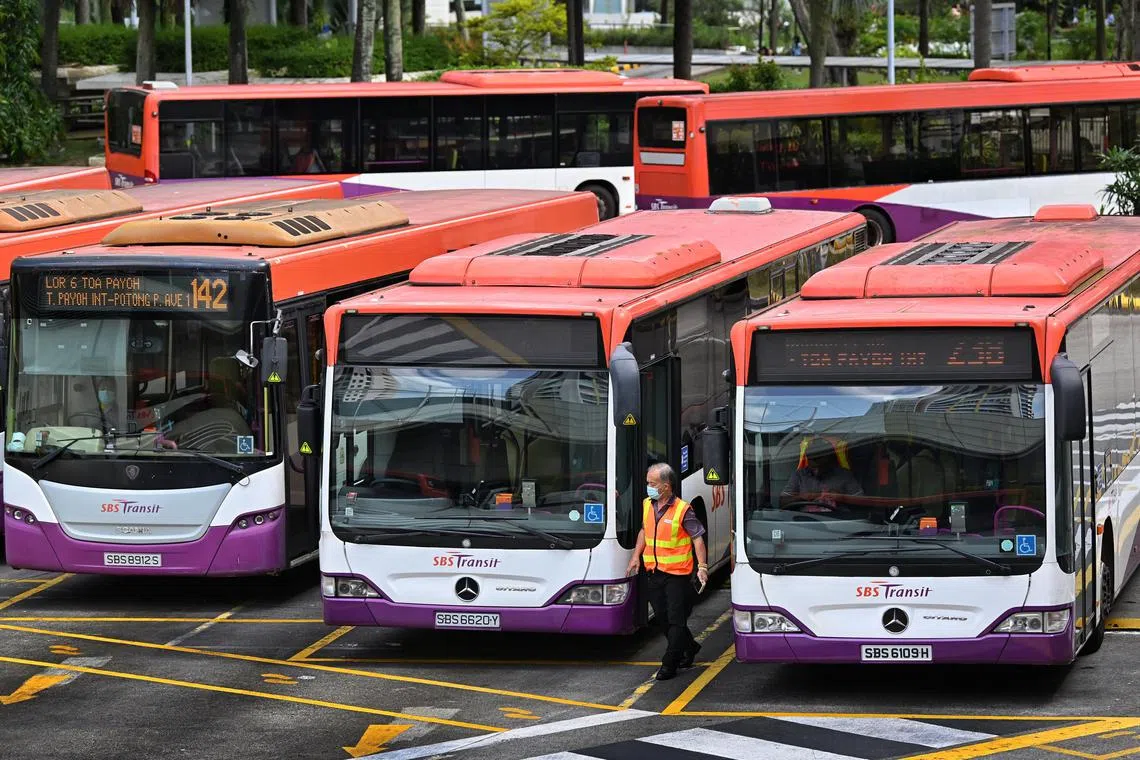SBS Transit to continue operating bus services from Seletar depot until at least 2030
Sign up now: Get ST's newsletters delivered to your inbox

The public transport operator on July 19 won the right to continue running a total of 29 bus routes under the Seletar bus package.
PHOTO: ST FILE
SINGAPORE – Public bus services operating from Seletar bus depot, including 24, 70 and 130, will continue to be run by SBS Transit (SBST) until at least 2030.
The public transport operator on July 19 won the right to continue running a total of 29 bus routes under the Seletar bus package with a $526 million bid.
This fee, which will be paid by the Land Transport Authority (LTA), is for a five-year contract, but it may be adjusted for factors such as inflation, change in wage levels and fuel costs during the contract period.
Under the new contract, which will start from the first quarter of 2025, SBST will continue to manage bus interchanges in Ang Mo Kio and Yio Chu Kang too.
LTA said on July 19 that it has the option to extend the contract with SBST by between two and five years at the end of the five-year term.
SBST beat out two other bus operators here, SMRT Buses and Tower Transit Singapore. It also trumped two foreign bidders
LTA said SBST received the highest total score after taking into account quality and price factors. The authority noted that SBST’s proposal included initiatives that would raise standards for the public bus industry as a whole.
For instance, SBST said it will work with the Singapore Bus Academy to set up an electric bus training centre at Seletar bus depot to better prepare the public bus workforce for the transition to electric buses.
Singapore wants half of its public bus fleet to be electric by 2030.
The new centre will adopt mixed-reality technology – which blends views of the real world with digital content – for training, LTA said.
SBST also proposed rolling out a bus service tailored to young school-going children
LTA said both initiatives are now being trialled at Ang Mo Kio bus interchange.
Singapore’s public bus system uses a contracting model, which means operators bid for contracts and are paid a fee by LTA to run the services. The bus routes, and the accompanying depots and interchanges, are bundled by geographic area.
There are 14 such bus packages today.
The Seletar package was first put up for tender in 2016, and SBST won the bid in 2018 with a $480 million bid. This earlier contract was then extended by two years until 2025.
In October 2023, LTA called a new tender for the Seletar package, which drew five bidders.
The Bravo Transport-Ascendal Group joint venture put in the highest bid at $612 million, followed by SMRT Buses at $577 million and Nex Continental at $560 million.
SMRT Buses also put in a lower alternative bid of $550 million. Similarly, SBST put in a $542 million “base” bid and an alternative $526 million bid that ultimately won.
As for Tower Transit Singapore, its three bids – a $540 million “base” bid, and $523 million and $520 million alternatives – were all unsuccessful.
LTA said the tender submissions were evaluated using a two-envelope process, which means they were first evaluated based on quality before the price submissions were looked at.
SBST’s group chief executive Jeffrey Sim said the company is pleased to have been awarded the Seletar contract for a second consecutive term, and expressed appreciation for LTA’s continued trust.
He said SBST passengers can look forward to better service, noting the various new initiatives that the operator intends to introduce.
In addition to the electric bus training centre and virtual assistant, Mr Sim said SBST will set up a public transport inclusiveness training centre so bus drivers and the public can learn how to assist vulnerable commuters through experiential learning.
Separately, National Transport Workers’ Union executive secretary Melvin Yong said in a Facebook post that SBST winning the Seletar bus package tender meant minimal changes for the roughly 800 employees who would have been impacted.
“We do not expect any significant challenges for this transition,” said Mr Yong, who is also Member of Parliament for Radin Mas.
“The union will work closely with SBST to ensure that all affected workers will have a smooth transition,” he added.
Associate Professor Raymond Ong, a transport infrastructure researcher at the National University of Singapore, said SBST being the incumbent means it already has the necessary experience to run the Seletar bus services.
He added: “I think it is the comprehensiveness of the proposal that hit the nail on the head. It is not just price and quality, but also the community and industry engagement and support.”



